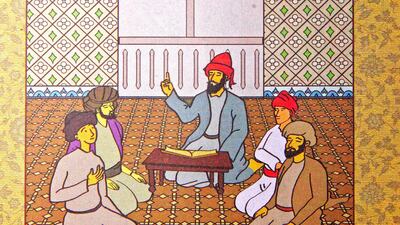Since 1994, the first Thursday in October has been designated in the UK as National Poetry Day. In 1996, the Academy of American Poets declared April National Poetry Month in the US. By 1999, Unesco was in on the act too, announcing March 21 as World Poetry Day. There can be no doubting the growing, international popularity of poetry.
According to the US National Endowment for the Arts, between 2012 and 2017 the number of American youth reading poetry doubled. Poetry sales have also been soaring in recent years. For example, according to Nielsen BookScan, a publishing industry data provider, 2019 was the best year ever for printed poetry in the UK, where sales have increased by 40 per cent in the past five years. Most of this growth is attributable to young people, with two thirds of buyers under the age of 34.

One reason for the poetry boom is social media. The rise of so-called "instapoets" has been meteoric. Canadian poet and illustrator Rupi Kaur, for example, started her career by sharing works on Tumblr and Instagram. "What is stronger than the human heart which shatters over and over and still lives?" goes one of her well-known instapoems. Her debut poetry collection, Milk and Honey, spent 77 weeks on the New York Times bestseller list.
But surely, there has to be something more than social media behind poetry’s rising popularity. Indeed, the internet has facilitated supply, but what has stoked the fires of demand?
“Everywhere I go I find a poet has been there before me.” This quote, attributed to Sigmund Freud, expresses the idea that poetry can connect us with deeper understandings and healing insights. Perhaps it is poetry’s ability to console us and enhance our appreciation of existence that lies at the heart of the current boom.
The rate of mental health problems among young people in some nations has increased dramatically in recent years. It is the same young people – aged 13 to 25 – who account for the bulk of the increase in print poetry sales. Are we using poetry to self-soothe in these uncertain times? Are we using the authenticity and clarity of poetry as an antidote to the current deluge of fake news, commercial spin and political propaganda?
A few years ago, I signed up for a course in mindfulness-based stress reduction. One of the things that struck me about this eight-week programme, designed to help people better manage their moods, was the amount of poetry involved. Each session, we would practise some form of meditation, and the course teacher would skilfully weave in a short poem. At the end of the course, we were gifted a book of poetry, with each poem in some way related to the course themes: awareness, curiosity, acceptance and compassion. I personally found it very helpful, and certain lines from these poems can now quickly bring me back to a better place, helping me see the bigger picture.
Several other forms of psychotherapy also integrate poetry. For example, both acceptance and commitment therapy and dialectical behaviour therapy include poetry as a means of helping people overcome mental health problems. The 13th-century Persian poet Rumi and the Pulitzer Prize-winning poet Mary Oliver are regular reads. Rumi's The Guest House and Oliver's The Summer Day have become psychotherapeutic classics.
There are even some psychotherapists for whom the poem is the crucial mode of healing and personal development. Poetry therapy, a branch of art therapy, is an emerging profession. In the US, it is represented by the National Association for Poetry Therapy. NAPT-certified poetry therapists can go on to work in clinical, community and educational settings. If talking helps, then poetry, the highest form of verbal and written expression, can be a particularly potent therapeutic force.

The popularity of poetry in the UAE and the broader Arab world is unquestionable, and has been since pre-Islamic times. This regional love is reflected in the success of reality TV programmes such as Millions' Poet and Prince of Poets, launched in 2007 on Abu Dhabi TV. These series attract huge audiences, competing with televised football matches in the war for television ratings. I cannot imagine a show devoted to poetry being able to go head to head with the beautiful game in any other part of the world.
If poetry can console, help us heal and promote personal development, then perhaps we should be giving it even more attention. A national poetry day, week or month is a good start. I would also like to see more poetry in the workplace. Perhaps we could start our team meetings with a brief poetry reading – a poem that speaks to some organisational aspiration or a current challenge faced by the team? And maybe, rather than employing all outdoor advertising space for commercial purposes, some of it could be used to display beautiful poetry. In the words of Mary Oliver, “We need beauty because it makes us ache to be worthy of it.”
Justin Thomas is a professor of psychology at Zayed University and a columnist for The National


